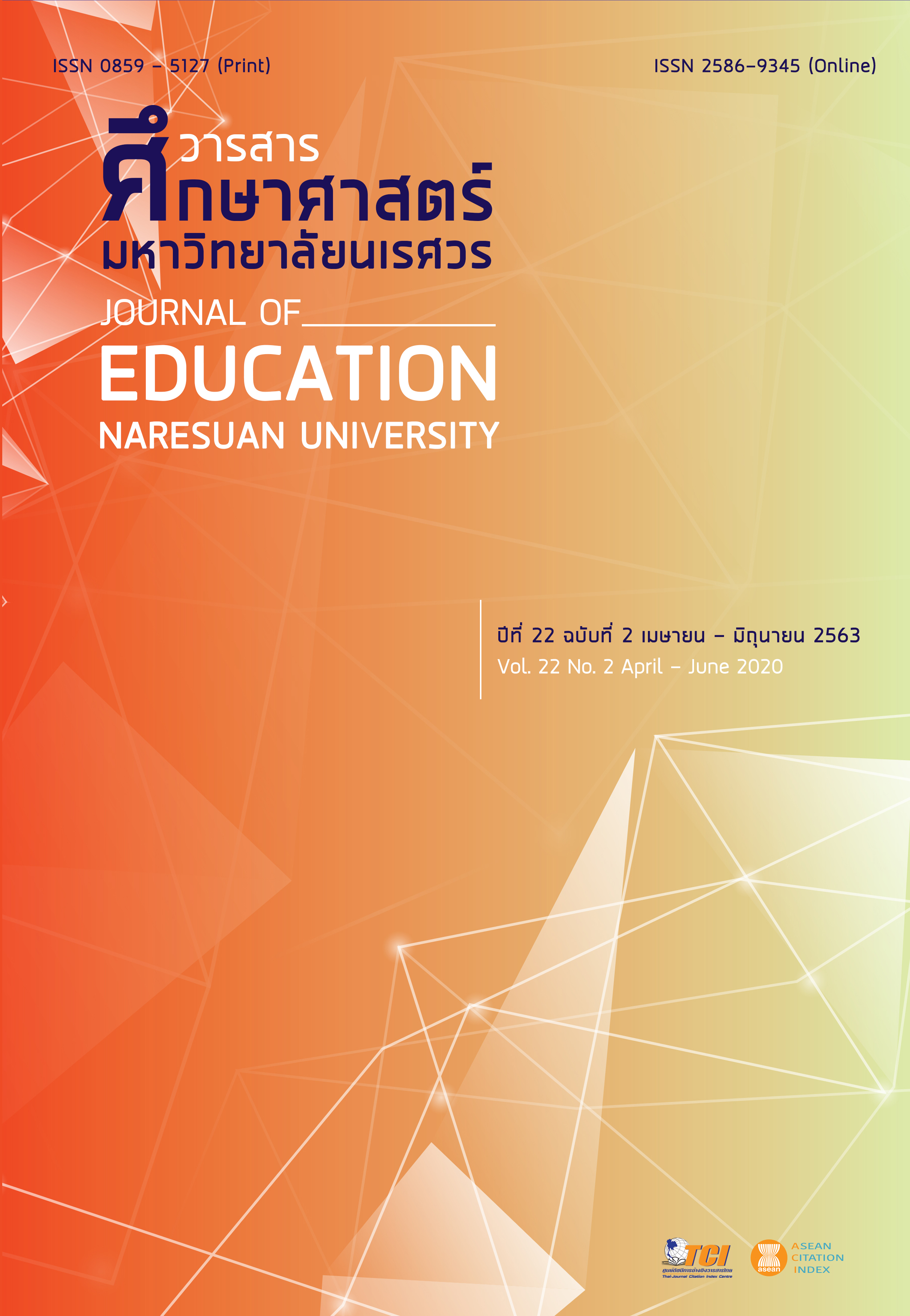THE EFFECT OF COOPERATIVE LEARNING STUDENT TEAM ACHIEVEMENT DIVISION (STAD) TECHNIQUE DEVELOPMENT ON LEARNING ACHIEVEMENT AND COMMUNICATION SKILL IN BIOLOGY OF MATTHAYOM 5 STUDENT
Main Article Content
Abstract
The purpose of this research was to compare analysis learning achievement communication skill and satisfaction in topic of blood circulation system lymphatic system and the immune system of Matthayom 5 student between experiment group learned through cooperative learning student team achievement division technique (STAD) and control group learned through conventional teaching model. The target group was M.5 with the total of 78 who enrolled in Science Math program. They were randomly selected for participating in the experiment using cluster random sampling method. The research instruments consisted of lesson plans cooperative learning student team achievement division technique (STAD), lesson plans conventional teaching model ,biology learning achievement test, communication skill test and satisfaction evaluation questionnaires. The data were analyzed by ANCOVA and Independent t-test. The research findings were as following.
1. Achievement in topic of blood circulation system lymphatic system of Matthayom 5 student who in cooperative learning student team achievement division technique (STAD) higher than those who learned through conventional teaching model at .05 level of significance.
2. Communication skill in cooperative learning student team achievement division technique (STAD) higher than those who learned through conventional teaching model at .05 level of significance.
3. The posttest of students satisfaction in cooperative learning student team achievement division technique (STAD) higher than those who learned through conventional teaching model at .05 level of significance.
Article Details
The owner of the article does not copy or violate any of its copyright. If any copyright infringement occurs or prosecution, in any case, the Editorial Board is not involved in all the rights to the owner of the article to be performed.
References
Boonchu, J. (2013). A study on science learning achievement and scientific attitude of mathayomsueksa 4 student using STAD (student teams achievement division) (Master thesis). Nakhon Si Thammarat: Nakhon Si Thammarat Rajabhat University. [in Thai]
Boonyang, P., Srisanyong, S., & Singlop, S. (2016). A development of learning active package on ecosystem using cooperative learning with STAD technique for grade 9 students. Journal of Education Naresuan University, 18(4), 223- 237. [in Thai]
Chanyoo, M. (2013). Results of biology learning activities mathayomsueksa 5 student on the topic photosynthesis with STAD (Independent study). Maha Sarakham: Mahasarakham University. [in Thai]
Chatsupakul, S. (2007). Comparisons of effect of STAD cooperative learning approach and conventional learning approach to higher-ordered thinking and communication skills of mathayomsueksa 1 student (Master thesis). Maha Sarakham: Mahasarakham University. [in Thai]
Chuenniran, S. (2011). Development of reading abilities of prathomsuksa 4 students by STAD collaborative groups (Independent study). Maha Sarakham: Mahasarakham University. [in Thai]
Dechachub, P. (2005). Behavioral Science teaching. Bangkok: Institute of Academic development. [in Thai]
Hempoom, S. (2012). The comparison of prathomsuksa 6 students’ learning achievement and learning satisfaction on the topic “human growth and body development” in health education subject through
cooperative learning teaching using STAD technique with conventional teaching (Master thesis, Mahasarakham University. [in Thai]
Kittiwongsa, N. (2015). Comparison of learning achievement and attitude towards biology on nervous system and sensory organs of grade 11 students using 7E learning cycle model and 7E learning cycle model with cooperative learning technique STAD (Master thesis). Chonburi: Burapha University. [in Thai]
Krumram, S., Srisanyong, S., & Singlop, S. (2016). A study effect of CIPPA concept together with STAD technique to develop biological learning achievement on genetic and science process skills for mathayomsuksa IV students. Journal of Education Naresuan University, 18(2), 202- 211. [in Thai]
Nuangchalerm, P. (2015). Learning science in the 21st century. Bangkok: Chulalongkorn University Press. [in Thai]
Office of the Education Council. (2015). Learning Reform Project (2014-2017) reflect problem and exit to respond to the reform of Thai education. Bangkok: 21Century. [in Thai]
Promseurb, J. (2016). A study of learning achievement and satisfaction of M.1 studies by the cooperative learning: student teams-achievement division (STAD) in science subject: acid-base solution (Master thesis). Chonburi: Burapha University. [in Thai]
Slavin, R. E. (1995). Cooperative learning: Theory research and practice (2nd ed.). Massachusetts: A Simon & Schuster Company.


